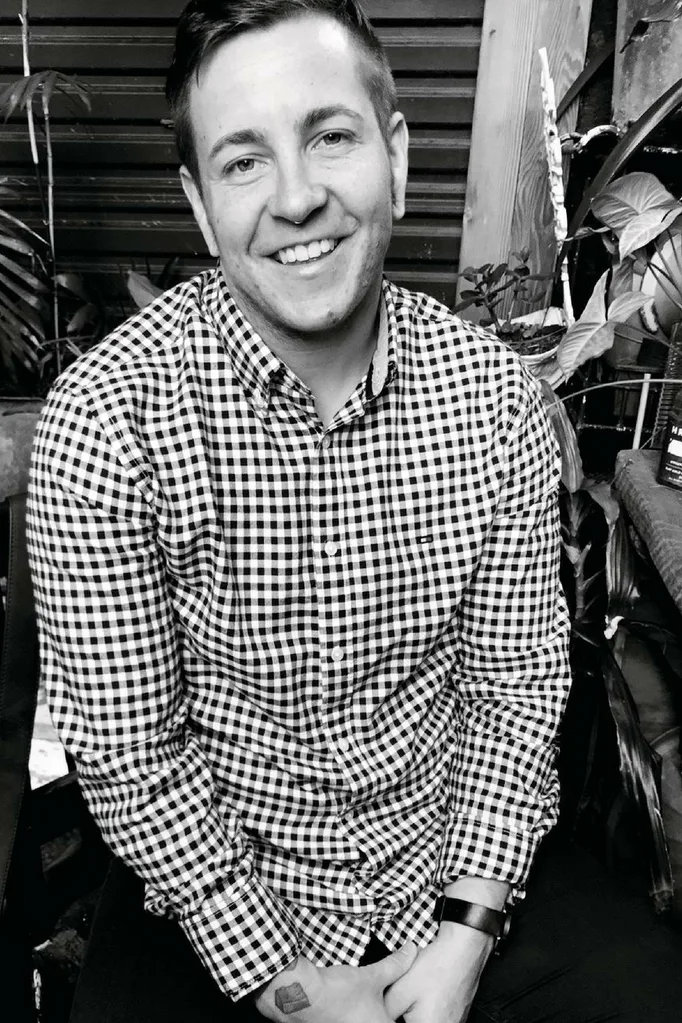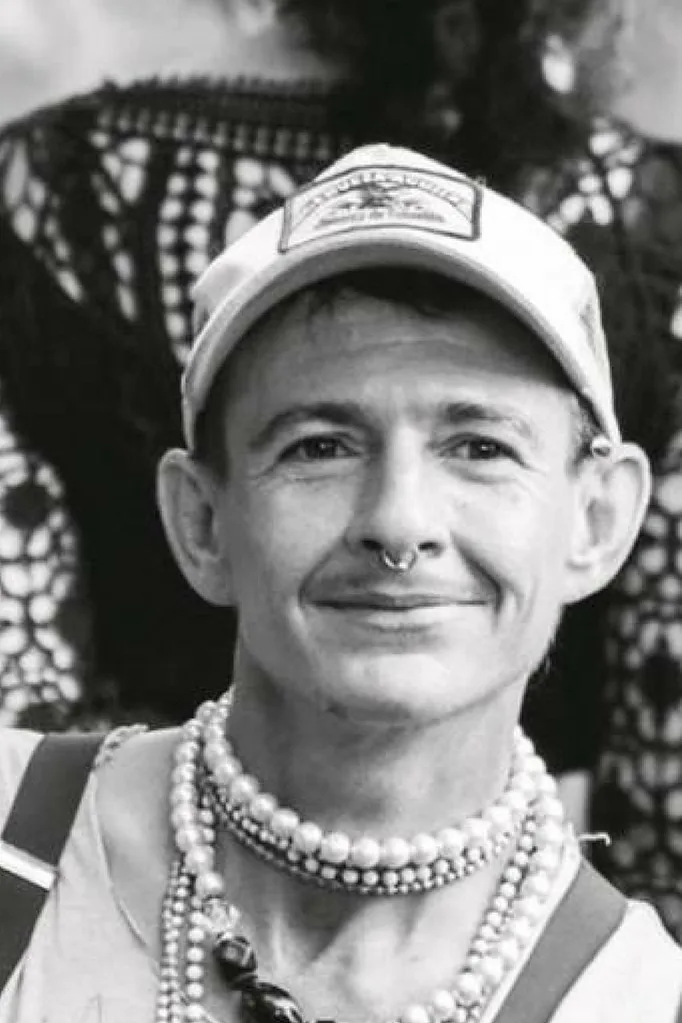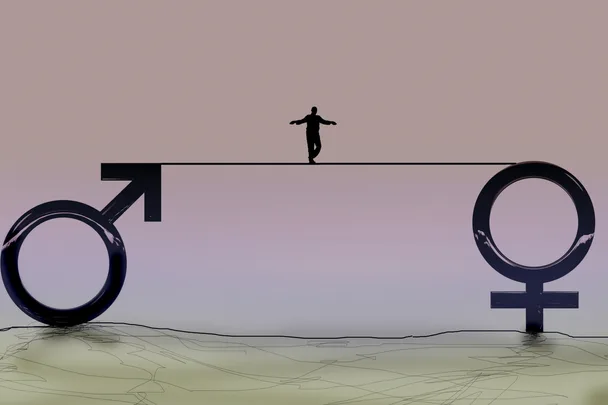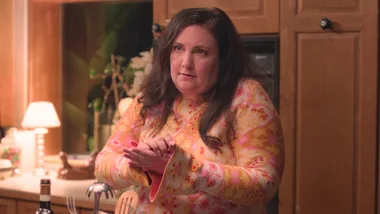Lollie Barr asked three men who were born female to share their unique perspective on what it’s like to be parachuted into the opposite gender.
Have you ever daydreamt about what it’d be like to ditch the heels, make-up and perpetual judgement of your looks and flip genders to experience the world as a man? To find out how men really talk about women; to understand what all that testosterone really feels like; to see what male privilege is like? The closest most of us get is wearing boyfriend jeans and nicking his Christian Dior Sauvage.
But for those who have transitioned, crossing over has given them a unique insight into how both sexes operate. While they’ve always identified as male, they’ve been socialised as women, so they have the remarkable ability to view life from both sides of the coin. We spoke to three trans guys who agreed to report back from the other side.
Testosterone Tales
Hormones. As women, we are only too aware how they can affect our lives for better (riding that joyous ovulation high) or for the absolute worse (hate-yourself-and-everyone-else PMS). So what is it like to be flooded with testosterone, the male sex hormone that dictates a man’s life?
“After starting testosterone, I definitely noticed a difference in how I thought,” Riley says, who now refers to his new thought patterns as his “boy brain”. “I felt surer of myself, and decision-making came more naturally. I’m more solution focused. For example, if a friend fell over, I’d be more concerned with getting a bandage instead of empathising [with] how she felt.”
His boy brain has also affected how he reacts to conflict. “When I was a girl, if I’d have a disagreement with my partner, I’d get upset because I was more emotionally driven,” he says. “Now, I’m more inclined to let things slide.”
Sido agrees, noting the testosterone made him worry less. “I’d always suffered from anxiety and I immediately noticed its absence. Guys are less inclined to worry about the small stuff .”
Ben says he certainly feels more authoritative since transitioning to a man, but he doesn’t blame it all on testosterone. “I believe it’s because I’m more authentic in who I am,” he says. “But I have noticed women defer to me more as a man.”
Boy Talk
Ben says guys feel more secure sticking to emotionless topics, namely work, sports and mutual friends. No soul-baring allowed. “Men are much more in the here and now. They talk about what they’re doing, or what they’re going to do. Meaningful conversations can be hard to find. You rarely hear a guy talking about his relationship or his feelings.”
“I’ve got awesome male friends, but I still nd it more interesting to talk to girls because they’re more complicated,’’ Riley says. “There is a clichéd thing that men don’t like to talk about feelings, but, in the bro code, it is absolutely true. Women need to process the world by going into depth emotionally. However, it’s way more chill with guys. Think simplistic – I mean really simplistic.”
He says the limited conversation comprised of small talk about sports can be boring, but Riley believes there’s also comfort in not having to plumb the emotional depths. “When you’re hanging with the guys, there’s no deep stuff going on. Straight up. There is also no code to their language. They tell it like it is. If they don’t like something, they say it, and it’s done. There are no ensuing dramas analysing what he really meant and no grudges held.”
All three agree men have a competitive desire to win that leaks its way into conversations. Nowhere is this more evident than with Donald Trump, who keeps pointing out how he’s smarter, richer, more popular and more successful than everyone else. “It’s like guys are programmed to always have to demonstrate they’re better, richer or smarter than the next dude,” observes Sido. “But one-upmanship is so boring.’’
Cracking The Bloke Code
Each gender has their own subtle nuances in the way that they communicate with their own. As women, we tend to be more inclined to be tactile and signal our approval of other women with hugs, a smile or compliments. According to our transgender guys, joining man-land meant getting used to vice-like handshakes, st bumps, chest hugs and bro nods.
“There was a day when the world stopped questioning what my gender was and just assumed I was male. Then men treated me differently,” says Sido. “It’s a fist pump instead of a hug goodbye. Or the triangular chest hug where you only touch shoulders. It’s weirdly so not intimate, even with your mates. Guys don’t like to show other guys they have a gentle or caring side.”
Riley says the subtle bro nod is a man’s way of communicating to another guy that he isn’t a danger. “It is almost imperceptible,” he says. “A guy will look at you and give you a very slight nod. It’s a male way of saying, ‘I’m not a threat.’ However, if you get direct eye contact without the head nod then your hackles rise.”

Checking His Male Privilege
Sido says he is now deferred to in a way he never experienced previously as a girl, and his newly acquired male privilege is demonstrated daily. As an example, he explains how he recently visited a female friend who was organising a cabaret show. “When the lighting guys arrived, they ignored her and wanted to engage me. It’s not even a thought or a conscious choice: they just see a guy and think he’s in charge. I’ve been to bars with female friends and have been asked by the barman, ‘What would the lady like to drink?’ I’m like, ‘You can ask her yourself!’ ”
Riley and his partner recently bought their first home together. “The realtor was an older guy, and he had all the time in the world for me. However, when Maddie would speak, he’d cut her off and not let her finish her sentences.”
Ben says that when privilege is challenged, men get defensive. “I find the defensiveness of my fellow men surprising,” he says. “For example when discussing #MeToo, instead of listening to women’s experiences, they’d immediately say not all men behave this way. Shouldn’t we be talking about the men that do and how to change it?”
Riley believes it’s the world they’ve grown up in that constantly gives them the impression they are more important than women. “Women are still scripted as having a support role. My partner and I were on holiday with another couple. There was an ad on the television that portrayed a woman doing the laundry and her husband handing her the washing basket. My partner commented that it was gender stereotyping. Instead of agreeing, our male friend got defensive and said, ‘You don’t know what the man did off the screen.’ He was literally defending a guy off an ad!”
All of our guys believe that male privilege is all but invisible to men. “They treat it as a bit of a joke,” says Ben. “They honestly don’t think men and women are treated differently. It’s like they believe they achieve purely on their own merit, not that the system has favoured them.”
Safety In Numbers
According to the report A Right to the Night, one in three young Australian women say they’re afraid to be in public spaces after dark. “Before my transition, I wouldn’t have taken my dog out for a walk at night,” says Ben. “Now I don’t have to worry about somebody taking advantage of the fact that I’m female and attacking me.”
Sido agrees to a point. However, he says, being a trans man, you still have to be wary. As for Riley, since transitioning he’s more on guard. “Being safety conscious is still applicable, if not more so. You’re constantly shaping up other men, thinking, ‘If this happens, I’ll react this way.’ I’ve also experienced a lot more road rage since I’ve fully passed as a man,” he says. “Men are very competitive with other guys on the road. They cut you off , swear at you and give you the finger. It’s only happened since I’ve been a guy and I don’t think I’ve become a worse driver.”

How Men Talk About Women
“You really don’t want to know,” cautions Sido. “It’s pretty gross.” All guys agreed men talk to each other differently when women aren’t around. Sido says he’s heard male co-workers sexualise female colleagues but also strangers. “A guy came up to me when I was standing outside a karaoke club. He started complaining the women were so loose that he might turn into a slut. Males use [this sexist behaviour] as a way of bonding. However, women also bond with other women by being derogatory about other women.”
Ben surmises that it’s a fear of coming across as weak, or gay. “They use sexist language to prove they are a red-blooded bloke.” However, he also says the language has changed. “They don’t call each other gay so much. It’s moved on. Now they accuse a guy of acting like a girl or calling each other a pussy. I always call them out on it.”
Riley says his experience is that not all men hold this attitude. “Look, you do get it. In my experience, regular men don’t act like this. It’s just idiots. You get a lot of idiots in both genders.”
It’s Not Always Easy Being A Man
According to the guys, the worst thing about be- ing a man is that you are regarded with suspicion. “I’m in a supermarket and notice a cute child with its mother; previously it wouldn’t have been ridiculous for me to smile at them,” says Ben. “Now I know the mother would be more protective. It’s the same with women in general. Once I transitioned, I had to be aware that being friendly could be perceived as flirting. It’s a subtle response, but women try to disengage from conversation. A man on his own can be seen as a threat. However, if I’m with my partner, women are more open.”
Riley relates. “I miss just clicking with women and having a relaxed conversation. Now you know they’re thinking, ‘What is your agenda?’ It takes a lot of time for them to work out that I’m OK. It’s like, ‘He’s got a girlfriend, he’s harmless, he just wants to be a friend.’ ”
As a mental health worker, Riley says it’s sad that mental health is a topic men still struggle with. “You often don’t know what a man is thinking. Men still find it hard to con de their inner worlds. Vulnerability is considered weak and weak is considered non-manly. However, a third of all deaths of young men are due to suicide.’’
Sido agrees. “There’s a sense of sadness you get from guys at the emotional isolation and loneliness because society says they have to behave in a certain way. In that way, women and men are more alike than we think.”
Ben believes the differences aren’t that vast after all: “When it comes down to it, men and women just want to feel connected and valued.”

This story originally appeared in the August issue of marie claire.










